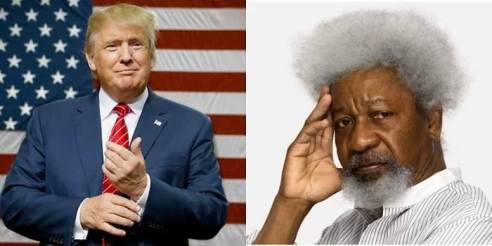Nobel laureate Prof. Wole Soyinka has criticized United States President Donald Trump over his recent threat to invade Nigeria with American military forces. Soyinka described Trump’s comments as careless, disrespectful and based on a shallow understanding of Nigeria’s complex security problems.
Speaking in Makurdi after a meeting with Benue State Governor Hyacinth Alia, the literary icon condemned Trump’s remarks and warned that foreign leaders must show respect when talking about sensitive national issues.
“You don’t just open your mouth and say you are coming to help whether we like it or not,” Soyinka said. “With poor, almost non-existent analysis, you say you are coming with guns blazing. At least respect those finding solutions to this unacceptable situation.”
The controversy began on October 31 when President Trump designated Nigeria a “Country of Particular Concern” over alleged killings of Christians. He followed this with a threat that he had instructed the US Defence Department to prepare for possible military action if the Nigerian government “continues to allow the killing of Christians.”
The statement triggered outrage in Nigeria, with many political leaders, religious groups and analysts warning that such threats could worsen tensions and damage diplomatic relations. Critics argued that Trump oversimplified Nigeria’s long-standing security challenges, which include attacks by extremist groups, banditry, communal clashes and criminal gangs.
Soyinka echoed these concerns, describing Trump’s remarks as evidence of a “pre-set mindset” that ignores the root causes of insecurity in the country.
Nigeria has faced severe security problems for more than a decade. In the North-East, Boko Haram and Islamic State West Africa Province (ISWAP) continue to launch deadly attacks on villages, schools and security personnel. In the North-West, bandit groups attack rural communities, kidnap schoolchildren and demand ransom. The Middle Belt, including Benue State where Soyinka spoke, has experienced violent clashes between farmers and herders.
These multiple layers of conflict have made Nigeria one of Africa’s most security-challenged countries. Experts say solving the crisis requires cooperation between federal and state governments, traditional rulers, security agencies and local communities—not foreign threats of military invasion.
Soyinka’s comments reflect the view of many Nigerians who believe that the country must address its problems internally, even as it accepts constructive international support where appropriate.
Soyinka stressed that victims of violence deserve respect, and that governments at all levels must continue working to protect citizens.
“Governments must protect citizens. Victims deserve respect,” he said. His comments were interpreted as a reminder that while Nigeria faces serious problems, the ongoing efforts by security agencies, state governments and community groups should not be dismissed.
Benue State, where Soyinka spoke, has suffered repeated attacks over the years. The state is one of the worst-hit by farmer-herder clashes, which have displaced thousands of residents and led to loss of lives and property. Governor Hyacinth Alia has made security a major focus of his administration, and his meeting with Soyinka was part of discussions on peace-building, cultural preservation and community resilience.
Trump’s threat marks one of the most aggressive statements a US president has ever made about Nigeria. Many analysts believe that such language could damage diplomatic ties between both nations if not handled carefully.
Nigeria and the United States have traditionally shared close cooperation in trade, security assistance, education and public health programs. The US has provided support in Nigeria’s fight against terrorism, including intelligence sharing, training and equipment. However, direct military intervention—especially without Nigeria’s consent—would break decades of diplomatic norms.
Soyinka’s comments have drawn support from several political commentators who say Nigeria must not allow foreign powers to dictate its internal affairs. They argue that while Nigeria must address religious violence and human rights concerns, threats of invasion are unacceptable.
Some religious groups, however, welcomed Trump’s attention to the issue of attacks on Christians, saying the government must do more to protect vulnerable communities. But even many within these groups disagreed with the idea of a foreign military intervention.
Civil society organisations also cautioned the Nigerian government to take human rights concerns seriously to avoid giving foreign nations grounds for interference.
The federal government has not issued a detailed response to Trump’s threat, but senior officials have privately described the comments as “unhelpful” and “uninformed.” They say Nigeria will continue working to improve security through internal reforms, expanded military operations and better policing.
Human rights groups have urged both the Nigerian and US governments to engage diplomatically rather than escalate tensions. They also called for improved protection of religious groups, more support for displaced persons and a renewed commitment to justice.
Soyinka, one of Nigeria’s most respected voices, ended his remarks by urging foreign leaders to think carefully before making comments on Nigeria’s internal issues.
“No leader should talk loosely about invading another country without understanding its realities,” he said.
As Nigeria continues to struggle with insecurity, the debate over Trump’s remarks highlights a much larger question: how should foreign nations engage with African countries facing internal crises? For many Nigerians, the answer lies in cooperation—never in threats or “guns blazing.”

